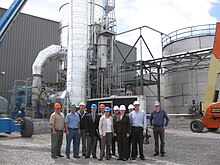
A biorefinery is a refinery that converts biomass to energy and other beneficial byproducts (such as chemicals). The International Energy Agency Bioenergy Task 42 defined biorefining as "the sustainable processing of biomass into a spectrum of bio-based products (food, feed, chemicals, materials) and bioenergy (biofuels, power and/or heat)".[1] As refineries, biorefineries can provide multiple chemicals by fractioning an initial raw material (biomass) into multiple intermediates (carbohydrates, proteins, triglycerides) that can be further converted into value-added products.[2] Each refining phase is also referred to as a "cascading phase".[3][4] The use of biomass as feedstock can provide a benefit by reducing the impacts on the environment, as lower pollutants emissions and reduction in the emissions of hazard products.[5] In addition, biorefineries are intended to achieve the following goals:[6]
- Supply the current fuels and chemical building blocks
- Supply new building blocks for the production of novel materials with disruptive characteristics
- Creation of new jobs, including rural areas
- Valorization of waste (agricultural, urban, and industrial waste)
- Achieve the ultimate goal of reducing GHG emissions
- ^ International Energy Agency - Bioenergy Task 42. "Bio-based Chemicals: Value Added Products from Biorefineries | Bioenergy" (PDF). Retrieved 2019-02-11.
{{cite web}}: CS1 maint: numeric names: authors list (link) - ^ Cherubini, Francesco (July 2017). "The biorefinery concept: Using biomass instead of oil for producing energy and chemicals". Energy Conversion and Management. 15 (7). Elsevier: 1412–1421. doi:10.1016/j.enconman.2010.01.015. ISSN 0196-8904.
- ^ Hoeven, Diederik van der (2018-01-17). "Seaweed biorefinery: much work, high hopes". Bio Based Press. Retrieved 2022-08-02.
- ^ Cascade, Macro. "Products". Macro Cascade. Retrieved 2022-08-02.
- ^ Bajpai, Pratima (2013). Biorefinery in the Pulp and Paper Industry. Elsevier. p. 99. ISBN 9780124095083.
- ^ Qureshi, Nasib; Hodge, David; Vertès, Alain (2014). Biorefineries. Integrated Biochemical Processes for Liquid Biofuels. Elsevier. p. 59. ISBN 9780444594983.